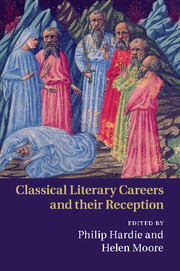Book contents
- Frontmatter
- Contents
- List of contributors
- Preface
- Note on the text
- Introduction: Literary careers – Classical models and their receptions
- 1 Some Virgilian unities
- 2 There and back again: Horace's poetic career
- 3 The Ovidian career model: Ovid, Gallus, Apuleius, Boccaccio
- 4 An elegist's career: from Cynthia to Cornelia
- 5 Persona and satiric career in Juvenal
- 6 The indistinct literary careers of Cicero and Pliny the Younger
- 7 Re-inventing Virgil's Wheel: the poet and his work from Dante to Petrarch
- 8 Did Shakespeare have a literary career?
- 9 New spins on old rotas: Virgil, Ovid, Milton
- 10 Bookburning and the poetic deathbed: the legacy of Virgil
- 11 Literary afterlives: metempsychosis from Ennius to Jorge Luis Borges
- 12 ‘Mirrored doubles’: Andrew Marvell, the remaking of poetry and the poet's career
- 13 Dryden and the complete career
- 14 Goethe's elegiac sabbatical
- 15 Wordsworth's career prospects: ‘peculiar language’ and public epigraphs
- Epilogue: Inventing a life – a personal view of literary careers
- List of works cited
- Index
Introduction: Literary careers – Classical models and their receptions
Published online by Cambridge University Press: 10 November 2010
- Frontmatter
- Contents
- List of contributors
- Preface
- Note on the text
- Introduction: Literary careers – Classical models and their receptions
- 1 Some Virgilian unities
- 2 There and back again: Horace's poetic career
- 3 The Ovidian career model: Ovid, Gallus, Apuleius, Boccaccio
- 4 An elegist's career: from Cynthia to Cornelia
- 5 Persona and satiric career in Juvenal
- 6 The indistinct literary careers of Cicero and Pliny the Younger
- 7 Re-inventing Virgil's Wheel: the poet and his work from Dante to Petrarch
- 8 Did Shakespeare have a literary career?
- 9 New spins on old rotas: Virgil, Ovid, Milton
- 10 Bookburning and the poetic deathbed: the legacy of Virgil
- 11 Literary afterlives: metempsychosis from Ennius to Jorge Luis Borges
- 12 ‘Mirrored doubles’: Andrew Marvell, the remaking of poetry and the poet's career
- 13 Dryden and the complete career
- 14 Goethe's elegiac sabbatical
- 15 Wordsworth's career prospects: ‘peculiar language’ and public epigraphs
- Epilogue: Inventing a life – a personal view of literary careers
- List of works cited
- Index
Summary
The subject of literary careers has attracted considerable interest recently among both classicists and students of English and other vernacular literatures. ‘Career criticism’ has emerged as a distinct branch of literary scholarship and criticism. It is to be distinguished from the older fashion for a life-and-works approach to the biographical criticism of an author, and also from the more recent interest in the ancient tradition of authors' lives. Instead of starting from what might be known, or claimed, about the historical life and times of an author, career criticism takes as its starting point the totality of an author's textual output and asks how that oeuvre as a whole shapes itself, both in its intratextual relationships (what kinds of beginnings, middles, and ends are traced in the pattern of an oeuvre), and in the claims it makes to reflect or mould extratextual conditions of production (whether located in the personal history of the author, or in the relationship of the author to political and cultural structures of power and authority). The previous sentence ascribes an agency to the oeuvre in ‘shaping’, ‘reflecting’ or ‘moulding’, an agency that can only be realized through a reader's perception of these processes. ‘Careers’, however, are things that authors, not texts or readers, pursue, and career criticism is unabashed in making the author its focus, always with the recognition that the author is mediated through texts, which in turn are always received by readers.
- Type
- Chapter
- Information
- Classical Literary Careers and their Reception , pp. 1 - 16Publisher: Cambridge University PressPrint publication year: 2010
- 1
- Cited by

